Oladimeji Solomon Yemi (Lead Writer)
Climate change poses a critical global crisis, impacting environments and threatening public health. According to the World Health Organisation (WHO), climate change is expected to cause approximately 250,000 additional deaths per year between 2030 and 2050, from undernutrition, malaria, diarrhoea, and heat stress alone. This calls for urgent collective action to protect communities worldwide.
The intersection between climate change, health, and nutrition is increasingly evident, with rising temperatures, extreme weather events, and environmental shifts disrupting food production, water resources, and disease patterns. This intersection also presents a multifaceted challenge in countries like Nigeria, which are vulnerable to changing climatic conditions. Data from the Cadre Harmonisé analysis, supported by UNICEF and World Food Programme (WFP) assessments, revealed severe food insecurity, with projections indicating that about 26.5 million people across the country will face acute hunger in the June-August 2024 lean season. “Persistent conflict, climate-induced challenges like widespread flooding, and escalating food prices significantly contribute to this crisis.”
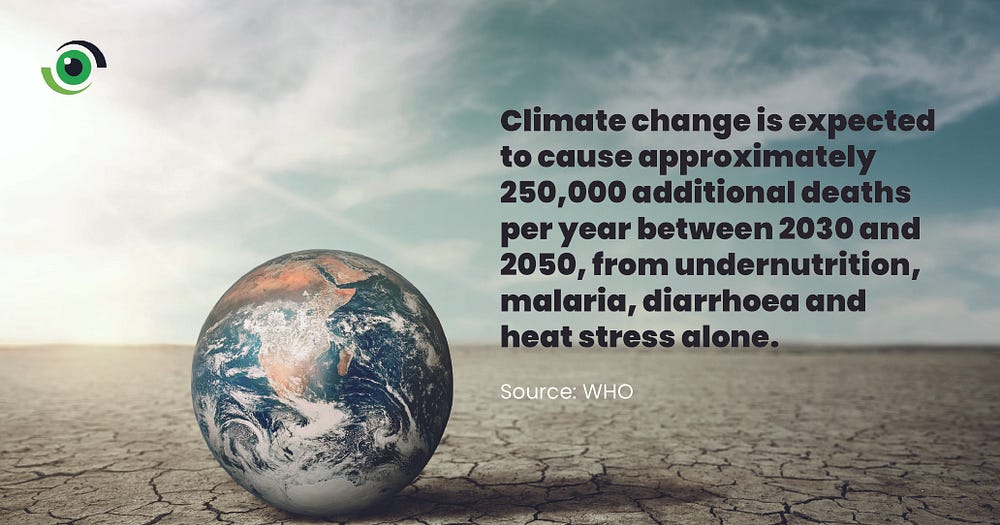
Madame Fatima, a mother of three living in Adamawa State had experienced significant challenges in accessing fresh and nutritious food during her pregnancy, which affected her ability to breastfeed her baby as well as provide sufficient nutrition to her young children. “I faced challenges providing sufficient nutrition for my baby. Whenever I put to bed due to unavailability of fresh and nutritious food; my breastmilk is usually not enough, and I had to buy expensive baby formula”. Fatima said.

Promoting nutritional improvements in Nigeria
Helen Keller Intl, driven by a commitment to address global health and food system disparities, spearheads transformative initiatives to uplift over a billion lives worldwide. In Nigeria, Helen Keller Intl operates across Adamawa, Akwa Ibom, Bauchi, Benue, Borno, Katsina, Kebbi, Lagos, Nasarawa, Sokoto, and Taraba states, with a focus on aligning with the critical intersection of climate, health, and nutrition.
The organisation is executing the Enhancing Food and Nutrition Security among Internally Displaced Persons (IDPs) project, a multifaceted and multisectoral approach tailored to combat the pressing issues exacerbated by climate change in Nigeria. Mr. Michael Daniel Eveshoyan, Technical Advisor for the Advancing Nutrition Projects, Helen Keller Intl; outlined the project’s distinct initiatives, such as the Food Systems Approach Programme and the Enhanced Homestead Food Production Programme which are meticulously crafted to mitigate any exacerbation of the prevailing challenges posed by climate change.
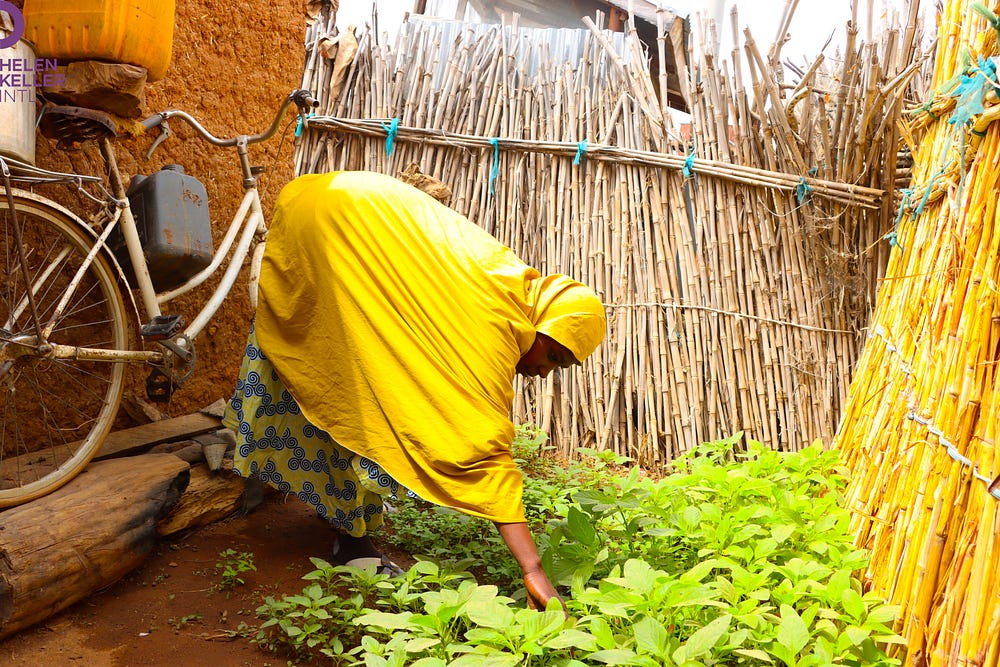
Through the Food Systems Approach Programme, Helen Keller Intl trained five agricultural extension workers and five supervisors to supervise the work of the agricultural extension worker. The training included the adoption of climate change mitigation approaches like the use of early maturing crops variety to mitigate the effect of climate change on food production in areas prone to shortened or erratic rainfall patterns and drought while also ensuring that interventions are specifically tailored to decrease the existing stress on climate change.
According to Mr. Michael, Helen Keller Intl’s Food Systems Approach Programme has embarked on a journey to empower communities and tackle climate change head-on. Through tailored training modules, agricultural extension workers and community members are equipped with specific skills and have a deeper understanding of climate-friendly practices.
“Our approach is far from generic; each intervention is meticulously tailored to address the distinct challenges faced by different communities. In every training session, climate issues take centre stage, sensitising beneficiaries to the importance of climate-friendly practices in securing food security.” He added.
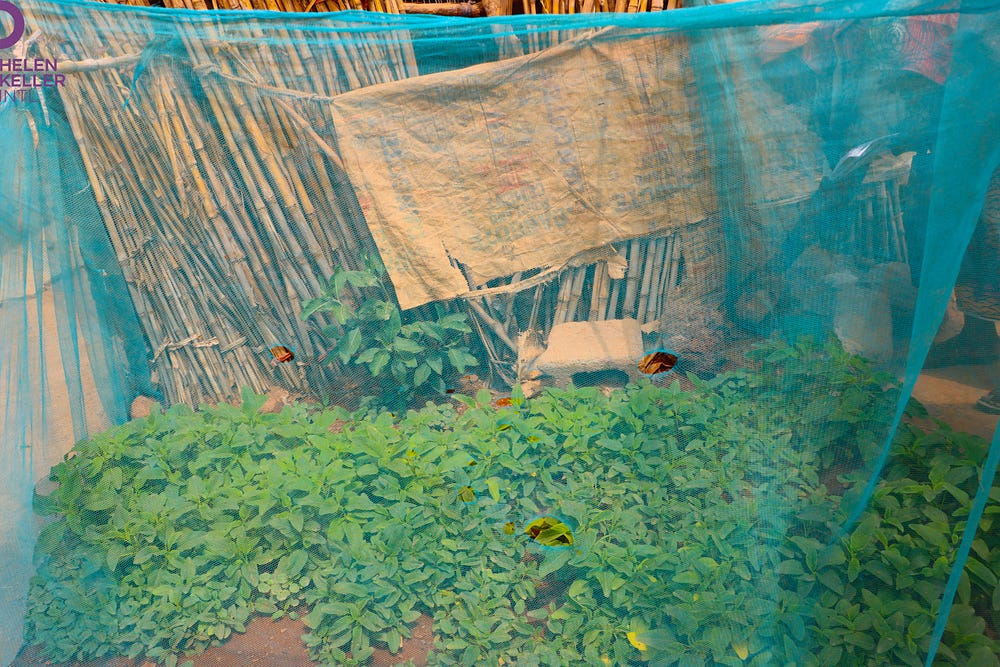
Home grown solutions
Home gardens can go a long way in reducing hunger and malnutrition, as well as encouraging sustainable farm practices that mitigate the impact of climate change. The Enhanced Homestead Food Production Intervention is a major initiative to improve the nutritional status of women and children through diverse and nutritious homestead food production, while addressing climate change-induced food security challenges, and improving nutrition, and healthy practices.
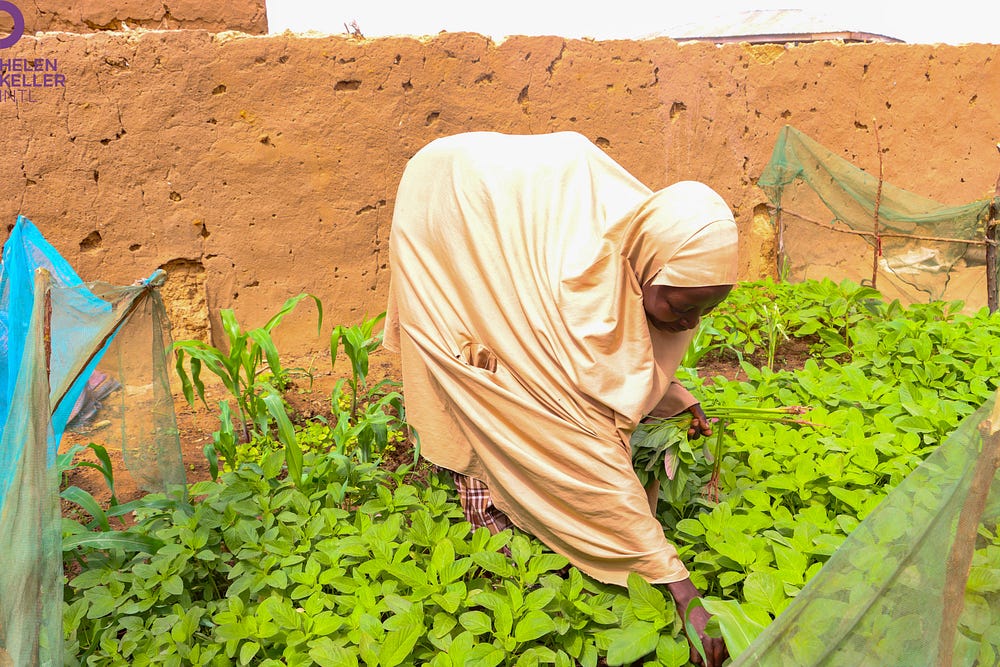
What’s Working
-
Nurturing the Nurturer: Promoting Adequate Nutrition for Pregnant Women in Sokoto State
The Save the Child Initiative, in collaboration with the Society for Women Development and Empowerment in Nigeria, is working to ensure that expectant mothers receive proper nutrition during pregnancy so they can deliver healthy babies. The initiative provides iron and folic acid supplements, nutrition counseling, hosts antenatal clinics, and even travels door-to-door to provide education and care to those in need. Read more
About 244 small-scale farmers (mainly vulnerable women who had been displaced or facing the impact of climate change) were supported to grow micronutrient-rich vegetables, fruits, and animal-source foods in Adamawa State. Helen Keller Intl empowered these women with the knowledge, skills and resources (including seeds) necessary for effective and sustainable homestead food production, aligning with Helen Keller Intl’s commitment to community empowerment. Helen Keller Intl also ensures the integration of climate-resilient agricultural practices into the Enhanced Homestead Food Production Intervention including educating and supporting farmers in adopting strategies that withstand climate impacts.
Mr. Michael highlighted that “this forward-thinking approach is aimed at addressing both immediate food security concerns and ensuring the long-term sustainability of agricultural practices while encouraging the adoption of healthier lifestyles and nutritional habits, creating a holistic impact on overall community well-being.”
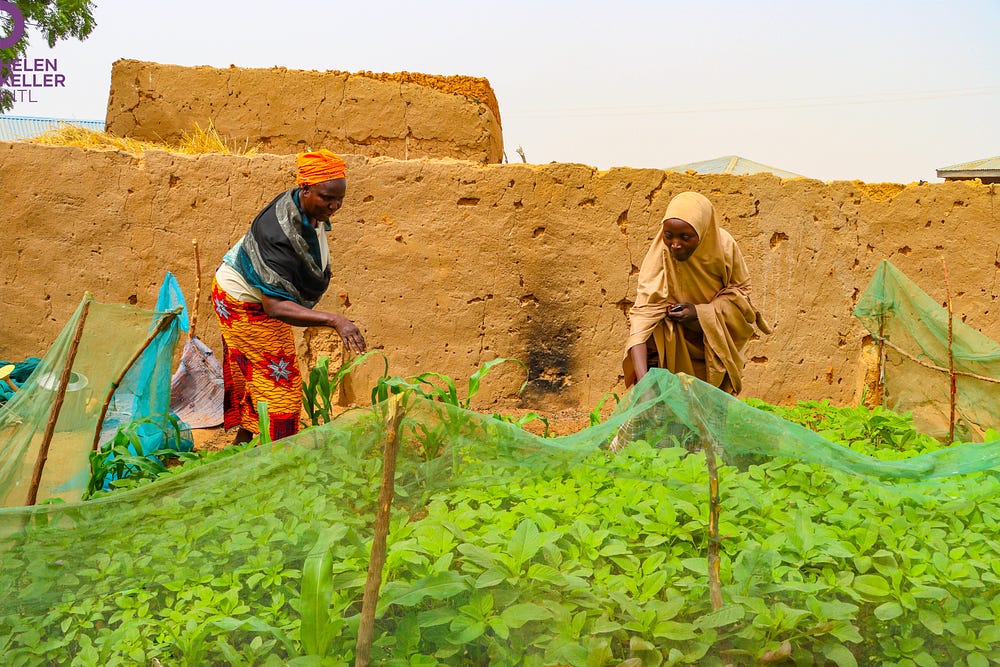
Monica Daniel, a resilient farmer displaced from Gwoza in Borno state Nigeria, faced challenges ranging from unpredictable weather patterns which disrupted her farming cycle to inadequate water supply and insufficient crop yields posed by climate variability on agriculture, health, and nutrition. The changing climate patterns affected the traditional farming practices in her region. In response, Monica embraced the agricultural training provided by Helen Keller Intl, learning sustainable techniques to adapt to climate-induced changes. “The training has enabled me to establish and maintain my own garden, contributing to a positive change in my life and that of my family.” Monica said.
Similarly, Helen Keller Intl also provided training on essential knowledge on nutrition and breastfeeding practices. Madame Fatima was able to improve her understanding of these practices and this positively impacted her child’s health. “The seeds provided empowered me to create a vegetable garden to address the nutritional needs of my family amidst the challenges posed by climate change”, Fatima shared.
Impacting communities and improving lives
Within a three-year period, Helen Keller Intl’s initiative trained 2962 beneficiaries on smarter techniques to cultivate micronutrient-rich foods. This comprehensive training was not just about enhancing nutritional practices; it served as a vital strategy in climate change adaptation.
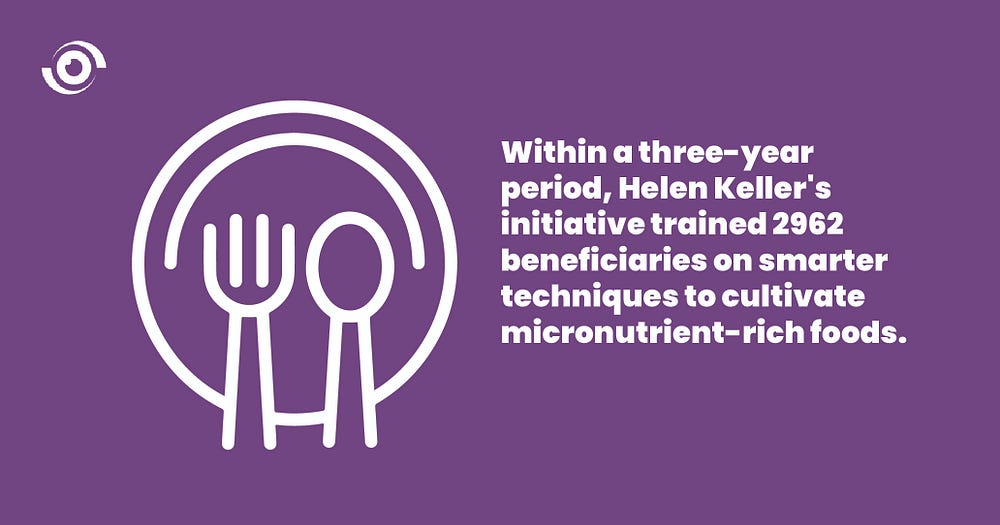
According to Monica, applying the irrigation methods to her crops, allowed her to farm throughout the year and ensuring a consistent supply of nutritious crops for her family. The focus on educating communities on efficient farming methods suitable for school and home gardens, even in limited spaces using recycled containers like discarded tires repurposed as planters, significantly contributed to sustainable agricultural practices. These methods not only bolstered food security but also aligned with environmentally conscious approaches, reducing waste and promoting resourceful, climate-resilient solutions. Such adaptive techniques hold the key to mitigating climate change impacts by fostering local resilience and sustainable food production.
Encouraging climate focus
Mr. Michael Eveshoyan highlighted costs, particularly the high expenses associated with climate-smart agro-inputs, notably seeds as part of the challenges faced while implementing the initiatives. While Helen Keller Intl initially provided some seeds, the expectation for farmers to eventually self-procure seeds proved daunting due to financial constraints. He emphasised the importance of governmental involvement in ensuring the availability of climate-resistant crop varieties to farmers. “There should be a level of training on how farmers can grow their seeds independently. Programmes encouraging community-based seed production are essential,” Mr Michael. Eveshoyan added.
The resistance to change among farmers rooted in traditional practices also posed some challenges during the implementation of these initiatives. “Our people are used to the old variety, making the transition to the new variety a challenge. Additionally, access to these improved inputs, especially the high costs of seeds like vitamin A-rich maize and cassava, posed hurdles,” he elaborated.
A significant number of the Nigerian population do not understand climate change and its impact. According to Mr Michael. Eveshoyan, there also needs to be awareness creation at the grassroots level about climate change issues by engaging with these communities to make them understand that climate change is a real and imminent threat is crucial.
Climate change is one of the biggest threats the world is facing currently, through Helen Keller Intl’s initiative, increased attention is being paid to addressing the complex nexus of climate, health, and nutrition challenges in Nigeria. However, intensified government support is imperative to ensure effective policy implementation and monitoring to achieve a resilient, nourished, and sustainable future for Nigeria.


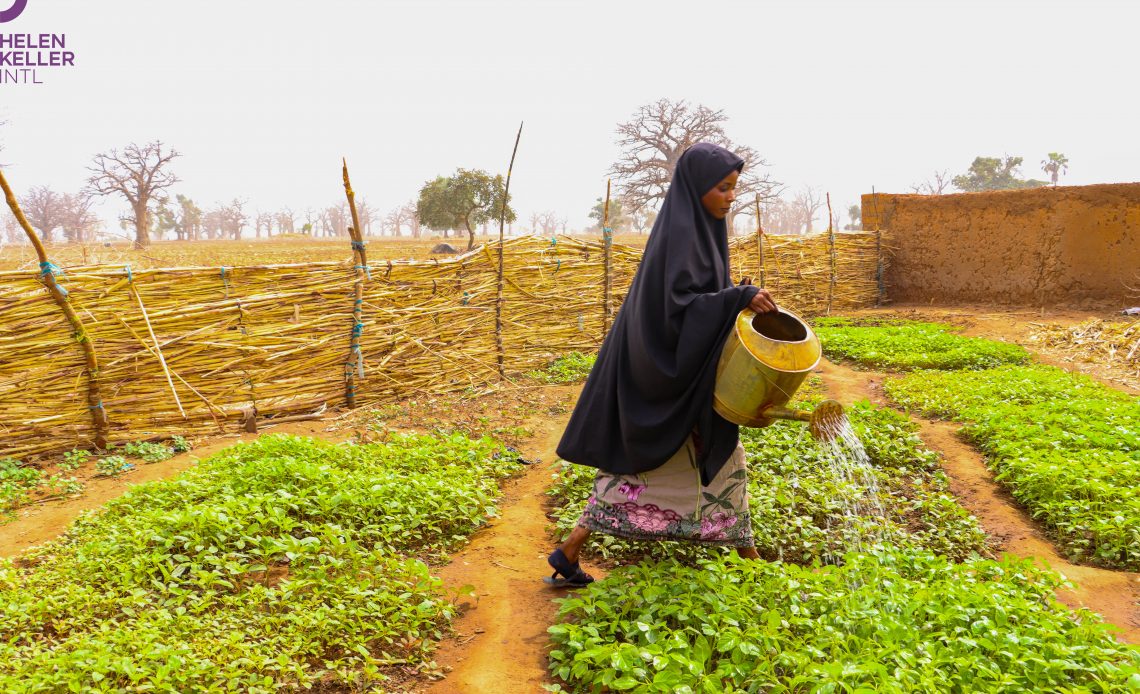
Very interesting articles!!